When Roberto il Guiscardo and his Brother Ruggero D'Altavilla defeated the Arabians and gave back Sicily to Cristianity in January 1072 a priest welcomed them. He was the Archibish...

Visit Palermo has never been so easy and affordable with the PMO TOURIST CARD. The servizi Pmo's tourist card includes all major Museum sites, architectural, historical and cultural sights of Palermo easily with the aid of the smartphone app, the map and the guide supplied with the card. Walking to the historic center you will find the artigianali shops and department stores, ristoranti and pubs at which to buy or taste street-food him and eno-gastronomic specialties of Palermo, with the margin of discount to holders of PmoCard. Move to the city to reach the churches, museums and theatres, to visit with biglietto ridotto , is easy with free tickets of the Amat spa, with bus CitySightseeing card and discounts on taxis and ApeTour.
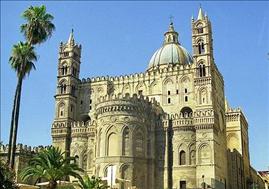

When Roberto il Guiscardo and his Brother Ruggero D'Altavilla defeated the Arabians and gave back Sicily to Cristianity in January 1072 a priest welcomed them. He was the Archibish...
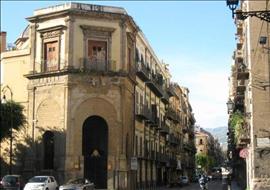
The Church of Saint John the Baptist the Neapolitan nation (this used to be the full name) is a church of the district courts of Palermo. In 1527 the rectors of the brotherhood of St John the Bapti...
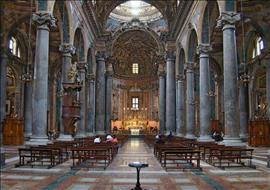
San Giuseppe dei Teatini is a church in Palermo. The Church was built in the 17th century by the Genoese architect Giacomo Besio following a Baroque style that is found mainly in the frescoes that de...
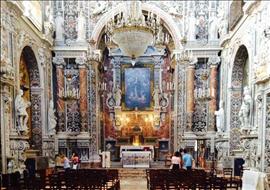
The Chiesa dell'Immacolata Concezione al " Capo " has nothing to envy to the most famous masterpieces of Sicilian Barocco . The austere façade is surrounded by numerous and colorful market stalls. The...
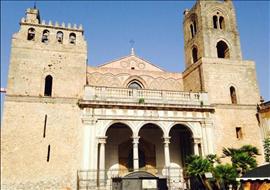
The Duomo di Monreale of 1172 is one of the monuments that represent the Arabo-Normanna architecture. In fact, along with the Cattedrale di Palermo and the Duomo di Cefalù is a candidate to joi...
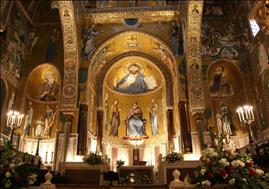

Is completely incorporated, on the first floor of Palazzo Reale or Normanni . It is dedicated to Saint Peter and was built at the behest of King Ruggero II in 1140. The Cappella Palatina higher is the...
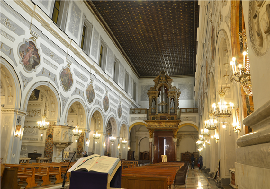

With the end of Grancia, it aimed to the Gancia or hospices and farms belonging to the monasteries. 1490 Church overlooks an alley but inside it preserves the style and the works of the great artists ...
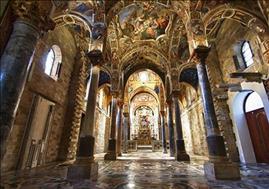
The Church is part of the Eparchia of Piana degli Albanesi , indeed, there takes place the Ortodosso ceremony but was founded before the Greci exodus from Albania following the Turkish conquests of th...
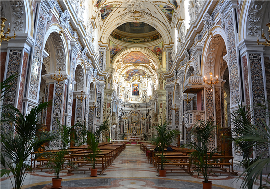

The Casa Professa Church, which is the parent company of the Gesù company, is the largest and most spectacular example of Barocco Siciliano . I gesuiti began to build it in the late 16th centur...
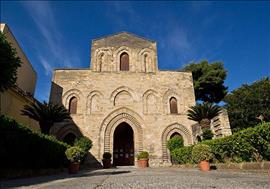
In the Kalsa quarter of the city, a few steps from the central train station, stands the Basilica of the Holy Trinity, usually called "the Magione." The construction of this splendid ch...
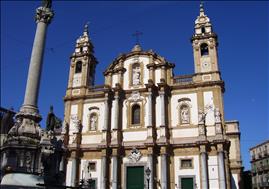
Is the seconda Chiesa after Cattedrale of Palermo and dates from XV sec . but his current facility is typically Barocco because it was ricostruita in 1640 . The imposing façade dates back to 1726 inst...
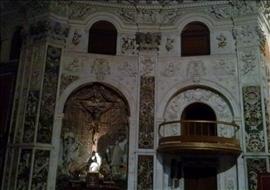
Church of Santissimo Salvatore The current building, with its oval structure, was built on the site of a former Norman church of 1071, at the end of the 17th Century it was renewed...
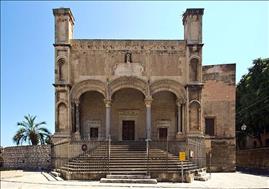
In Sicily, the combination of late-Renaissance elements and Catalan-Gothic gave birth to the so-called Rinascimento siciliano . The architect who had an interpreter, through the building up of the Chu...
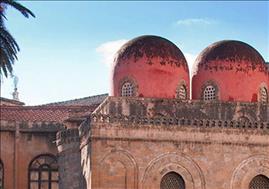
Three red domes immediately call attention to the tiny church of San Cataldo on the central Piazza Bellini. A pristine example of Arab-Norman architecture, San Cataldo dates f...
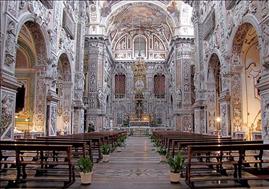
The building occupies two squares, one Pretoria where the Aquile Palace, seat of the city and town hall is located in the Vergogna fountain, called so because of the nude statues, and Bellini square, ...
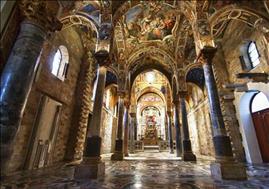
It dates back to 1570 and it was built where there was a small church dedicated to Saint Laurence. On the walls a number of putti and statues of the Virtues depict the lives of Saint Francis (on ...
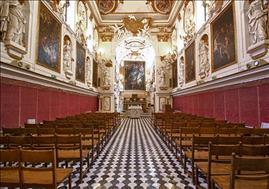
You will have the impression that Giacomo Serpotta sculpted the oratory in the stucco. The walls are enlivened with the frolics of putti, the small cherubim filled with t...
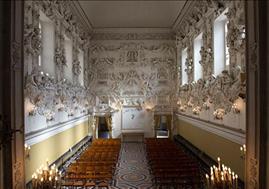
Santa Cita is the Tuscan distortion of Saint Zita. It is thus through the church of Saint Zita that you enter the oratory. The church in itself is remarkable for its chapel of the Rosary, to...
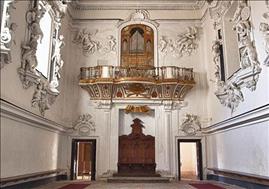

It was built in 1557 and after six years the sculptor Giacomo Serpotta started to work on its decorations. He was very young but already able to perfectly sculpt masks and shields on the 2 s...